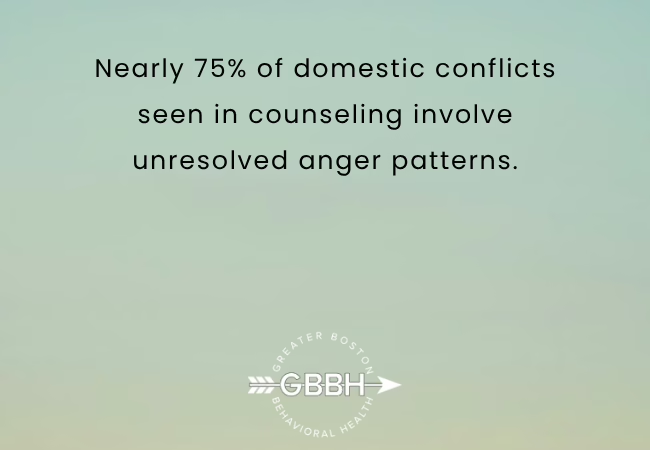Anger is a natural emotion, but when left unmanaged, it can become a destructive force in our closest relationships. Whether it’s an explosive outburst, silent resentment, or passive-aggressive behavior, unmanaged anger can damage trust, disrupt communication, and create emotional distance.
At Greater Boston Behavioral Health, we recognize that healing relationships starts with understanding yourself. That’s why our Anger Management Therapy in Massachusetts is designed to not only help you control your anger—but to rebuild the emotional connections it may have weakened.
How Anger Affects Communication and Connection
Uncontrolled anger tends to:
- Shut down communication
- Escalate minor issues into major conflicts
- Create a hostile or unsafe emotional environment
- Cause long-term emotional wounds for partners, family, and friends
These consequences are particularly devastating in romantic, familial, and workplace relationships—where repeated episodes of anger may lead to broken bonds, mistrust, or separation.
How Anger Management Therapy Works
Anger Management Therapy at our Mental Health Treatment Center in Massachusetts focuses on building insight, emotional control, and communication skills. Through evidence-based modalities like Cognitive Behavioral Therapy (CBT) and Dialectical Behavior Therapy (DBT), clients learn to:
- Identify and understand their anger triggers
- Reframe irrational or distorted thinking
- Express their needs assertively rather than aggressively
- Use calming techniques to de-escalate conflicts
Our programs are available through multiple levels of care, including Partial Hospitalization Programs (PHPs) and Intensive Outpatient Programs in Massachusetts.
Rebuilding Communication in Relationships
Effective communication is the cornerstone of any healthy relationship. Anger management therapy helps individuals:
- Use “I” statements instead of blame (e.g., “I feel hurt” vs. “You never listen”)
- Listen actively and without interruption
- Manage tone and body language to avoid misunderstandings
- Clarify needs and expectations in a respectful way
These changes, reinforced in our Mental Therapy Programs in Massachusetts, can transform hostile interactions into constructive conversations.
Healing Relationships with Loved Ones
Whether it’s a parent-child relationship, romantic partnership, or close friendship, anger can leave scars. Therapy provides tools to:
- Rebuild trust through consistency and changed behavior
- Offer and accept apologies with sincerity
- Repair emotional wounds caused by past outbursts
- Practice empathy and understand how your behavior impacts others
For clients in a Residential Treatment Program in Massachusetts, deeper family dynamics are often explored in structured sessions.
Family Involvement and Support
Many of our Inpatient Treatment Programs in Massachusetts include family therapy or psychoeducation sessions to help:
- Educate loved ones about anger, triggers, and emotional regulation
- Set healthy boundaries and expectations
- Create a supportive environment for relapse prevention
- Rebuild family roles that were affected by past anger or substance use
Involving family can accelerate healing and provide a strong foundation for lasting change.
Anger Management in the Workplace and Social Circles
Anger doesn’t just affect home life. It can also harm relationships with coworkers, supervisors, and peers. Therapy helps individuals learn:
- How to respond to criticism without defensiveness
- How to handle workplace stress without snapping
- How to disagree respectfully
- How to earn back professional credibility after a conflict
These skills are essential for clients who want to succeed in Mental Health Programs Massachusetts that integrate work-life balance and social reintegration.
When Anger Masks Deeper Emotional Issues
Anger is often a symptom—not the root cause. Beneath it, you may find:
- Anxiety
- Depression
- Trauma or PTSD
- Shame or unresolved grief
That’s why at Greater Boston Behavioral Health, our Mental Health Programs in Massachusetts address anger within the broader context of emotional and psychological healing.
Absolutely! Here are 4 new advanced sections you can add to further enhance your blog on “How Anger Management Therapy Can Improve Your Relationships” for Greater Boston Behavioral Health:
Recognizing Relationship Patterns Linked to Anger
Many people fall into recurring, harmful relationship patterns such as:
- Stonewalling: Shutting down during conflict
- Criticism cycles: Constant blame or negativity
- Explosive-reactive patterns: Arguments that escalate quickly
- Avoidant behavior: Withdrawing instead of communicating
Anger management therapy teaches clients to recognize these patterns early and break the cycle before it causes permanent damage.
How Greater Boston Behavioral Health Tailors Care for Couples and Families
At our Mental Health Treatment Center in Massachusetts, we integrate customized anger management plans based on:
- Relationship history and communication style
- Co-occurring mental health conditions
- Individual versus couple/family goals
- Cultural and relational values
We help individuals and their loved ones move from conflict to collaboration, using structured therapy goals and measurable progress tracking.
Relearning Emotional Safety: The Foundation of Relationship Repair
When anger has been a persistent issue, partners or family members often operate in “emotional survival mode.” This may include:
- Hypervigilance (walking on eggshells)
- Emotional distancing
- Loss of intimacy or vulnerability
Our therapists work to re-establish emotional safety, where all parties feel respected, heard, and free to express themselves without fear of aggression or shutdowns.
Integrating Anger Work into Broader Mental Health Programs
For clients also participating in:
- Partial Hospitalization Programs in Massachusetts (PHP)
- Intensive Outpatient Programs (IOP)
- Inpatient or Residential Treatment
…anger management is not treated in isolation. We blend it with trauma therapy, depression treatment, substance use support, and other core services to provide a holistic recovery experience that benefits all relationship types.
Anger Management Techniques That Foster Relationship Repair
Some of the most effective techniques we use to improve relationship dynamics include:
- Role-play exercises to rehearse difficult conversations
- Journaling to process emotions before expressing them
- Mindfulness training to regulate physiological arousal
- Boundary-setting skills to prevent resentment buildup
- Conflict resolution models like the DEARMAN and STOP skills from DBT
Clients practice these tools in a safe, structured setting and then apply them to real-life interactions.
Anger Management and Long-Term Relationship Growth
Improvement doesn’t end at therapy’s door. Long-term relationship growth involves:
- Ongoing self-reflection
- Regular check-ins with loved ones
- Accepting responsibility without defensiveness
- Maintaining consistent emotional regulation strategies
These outcomes are reinforced in both our PHP and IOP programs in Massachusetts, helping clients develop lifelong skills for relationship success.
Conclusion
Anger can drive a wedge between even the closest relationships—but it doesn’t have to. With the right support, what once caused distance and damage can become the spark for healing and growth. Anger management therapy isn’t about suppressing your feelings—it’s about learning how to express them constructively, communicate with clarity, and rebuild trust where it’s been lost.
At Greater Boston Behavioral Health, we specialize in helping individuals and families break free from reactive cycles and reconnect through compassion. Whether you’re seeking help through our Partial Hospitalization Program in Massachusetts, our flexible Intensive Outpatient Program, or one of our specialized mental therapy programs, you’ll find a safe space to heal, learn, and thrive—together. Take the first step toward healthier relationships today. Call us at 888.278.0716 to explore how our anger management therapy in Massachusetts can help you and your loved ones reconnect with purpose, patience, and peace.
FAQ on Anger Management Therapy & Relationship Recovery
Can anger management therapy really save a relationship?
Yes. Many relationships are strained by poor emotional regulation. Anger management therapy teaches communication, empathy, and conflict resolution—restoring trust and connection.
Is anger always a bad thing in relationships?
Not at all. Anger is a natural emotion. It becomes harmful when it’s uncontrolled or expressed destructively. Therapy helps channel anger into healthy, productive communication.
Does Greater Boston Behavioral Health offer anger therapy for couples?
Yes. Our Mental Health Treatment Center in Massachusetts offers both individual and family-focused anger therapy as part of our PHP and IOP programs.
How long does it take to see relationship improvements?
Many clients notice positive changes in 6–12 sessions, especially with consistency and family involvement. Progress depends on the severity of issues and willingness to change.
What if my partner won’t join therapy with me?
Even if your partner isn’t involved, your own progress can inspire change, improve your responses, and shift unhealthy relationship dynamics for the better.


